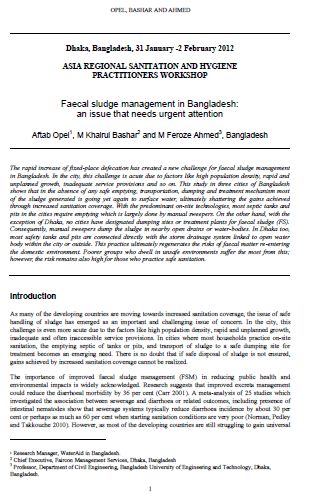Faecal sludge management in Bangladesh: an issue that needs urgent attention
Opel, A., Bashar, M. K., Ahmed, M. F. (2012)

Published in: 2012
Publisher:
Asia Regional Sanitation and Hygiene Practitioners Workshop, Dhaka, Bangladesh
Author:
Opel, A., Bashar, M. K., Ahmed, M. F.
Uploaded by:
SuSanA secretariat
Partner profile:
common upload
9529 Views
902 Downloads
Location of library entry
Content - Summary
The rapid increase of fixed-place defecation has created a new challenge for faecal sludge management in Bangladesh. In the city, this challenge is acute due to factors like high population density, rapid and unplanned growth, inadequate service provisions and so on. This study in three cities of Bangladesh shows that in the absence of any safe emptying, transportation, dumping and treatment mechanism most of the sludge generated is going yet again to surface water, ultimately shattering the gains achieved through increased sanitation coverage. With the predominant on-site technologies, most septic tanks and pits in the cities require emptying which is largely done by manual sweepers. On the other hand, with the exception of Dhaka, no cities have designated dumping sites or treatment plants for faecal sludge (FS). Consequently, manual sweepers dump the sludge in nearby open drains or water-bodies. In Dhaka too, most safety tanks and pits are connected directly with the storm drainage system linked to open water body within the city or outside. This practice ultimately regenerates the risks of faecal matter re-entering the domestic environment. Poorer groups who dwell in unsafe environments suffer the most from this; however, the risk remains also high for those who practice safe sanitation.
Bibliographic information
Opel, A., Bashar, M. K., Ahmed, M. F. (2012). Faecal sludge management in Bangladesh: an issue that needs urgent attention. Asia Regional Sanitation and Hygiene Practitioners Workshop, Dhaka, Bangladesh
Filter tags
East Asia & Pacific English Faecal sludge treatment processes Peri-urban















